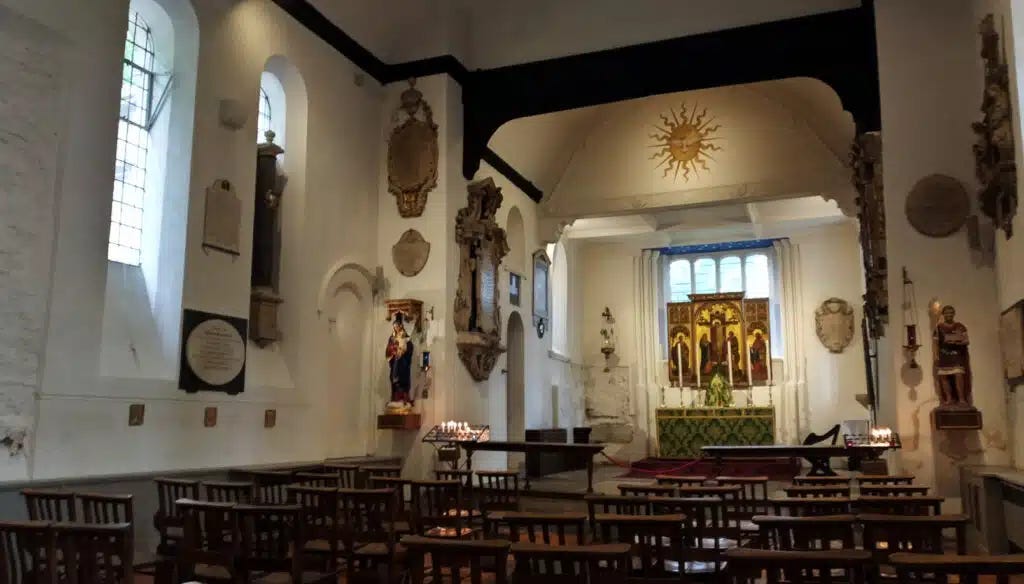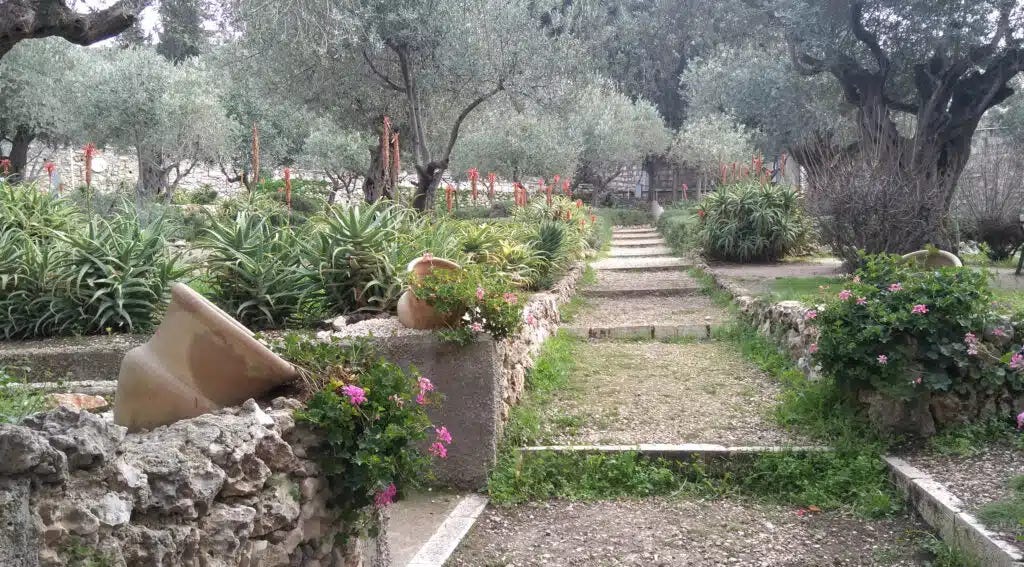Why the Sacred Matters
Society devoid of a spiritual dimension will soon become its own divinity.
I’ve developed a habit over the years, when travelling – or perhaps ‘an interest’ is a fairer word. Although I’ve never professed to be a Christian, I like to drop by at a church from time to time, especially if there are older ones. The chance to sit down on a pew and gaze into a space that has traversed the ages, while dedicated to eternity, and see momentary prayer candles burn up, has almost always been a beautiful respite on my wanderings. But not just a moment of respite – it has also been a reminder that somewhere in this hectic world, sanctities remain, buildings have been erected for them, and the experience of that fact alone has proven invigorating. (Noteworthy, perhaps, how the word ‘respite’ comes from ‘respiration’, or in other words acknowledges the restorative quality of ‘catching one’s breath’, or quietening down.)
What does it mean to say that something is sacred? I have thought of it as something which is of intrinsic importance for us. In other words, that the purpose of holding something sacred is to preserve it, since its loss would mean the crumbling of our whole being or identity.
Many people consider their homeland sacred, for without the land and its landscapes a country would retain little meaning. Or if a human being would be stripped of his spiritual quality and reduced merely to a combination of matter, his being ‘alive’ would really be bereft of deeper meaning. Sanctity, as a phenomenon, hence presumes something above or beyond the individual, as well as a world that is not single-level, but holds a horizontal as well as vertical dimension. The latter feels referenced also by the church spires pointing to heaven.

However, having said that, it is not at all difficult for me to understand people's frustration with religion. In fact, such disillusionment seems almost natural when you look at how the church as an institution has abused its power and position throughout history. Yet a closer look at what has happened should nonetheless make it clear that, in reality, such misdeeds speak rather of man's own inadequacy, of our corruptibility in this world, and not of the automatic deceitfulness of an idea of God or of any doctrine that speaks of Him. To say that because a priest misappropriated the donations he received, or a pastor was a child molester, God cannot exist, seems to me about as good as saying that the laws of physics do not apply because the scientist who discovered them was not himself morally blameless. Or to say that, because there has been corruption in government, all government departments should be abolished as a matter of principle. It may be noted at that that the general public seems usually more forgiving of non-religious identities and overlook their faults and shortcomings – hard to hear anyone saying that since atheists have committed countless crimes in the course of time, atheism is not a valid worldview. Somehow, in such cases, it is easier for people to see the individual responsibility of the person, regardless that in a way or other we are probably all representing some particular worldview.
Looking back in history, it was probably the postmodernist ideology that first asserted that there is no such thing as absolute truth and hence no such thing as the sacred, thus paradoxically establishing itself as the only absolute truth – that there is no such thing as absolute truth became a claim to be accepted as the new absolute truth. Whether as a result of this or something else, today's world seems to live in a profound self-denial in believing that the sacraments are unnecessary and that it has none for they are irrational. In truth, today's social and political landscape is full of sanctities of a kind, the only difference being that they are no longer called religious and are not linked to the world of the spiritual, defending ideological and social values instead.
Today's 'neo-sanctities' are laid down in laws that tell us what can and cannot be said – what hate is and (by implication) what love should be, what kind of knowledge can or cannot be disseminated, etc. And just as in the days of the Church, when to go against the institution often meant the loss of one's position in society, the same can happen now for breaking with the ideological mainstream, via personal cancellation or a disrupted career. The only difference is perhaps that, whereas in the old days those who spoke out against the paradigm were threatened with hell in the afterlife, those daring it now can end up in a prison already in this world.
During the Paris Olympics this summer, there was much talk of the inaptitude of the opening ceremony and of the bacchanalian mockery of the Holy Communion in particular. Whatever view one holds on it exactly, my attention was caught by a comment made by Mattias Desmet, pondering what would have happened if the Islamic sacraments had been presented at the occasion with the same kind of irony. Which in turn begs the question, why are we so quick to ridicule our own sanctities and heritage but not those of others? Is it really a progressive uprising against the former supremacy of one religion – while at the same time holding seeming respect for another religion – or is it perhaps not about religion at all and the issue is something else. Such as moral self-image and self-enhancement?
I do not think that sanctities can never be mocked. However, I do believe that once we start to ridicule the vertical or spiritual dimension of man in general, we have lost something of our humanity and are gradually elbowing ourselves into the position of God. Sooner or later, we ourselves will then become the one to whose logic the world is supposedly subject, the one who knows the 'ineffable truth'. Which is likely to be one of the reasons why so many are fond of the reductionist side of modern science – a vision of the world as one subject to predictable laws, reducible to reactions between inanimate particles, allowing us to tell exactly what is life and the world is like. With that vision, one can undo any previous hierarchies and become the hidden god oneself. (Ayaan Hirsi Ali, Somalia-born author who later emigrated to the West has made a noteworthy observation in this regard, saying that what distinguishes a free society from a totalitarian one, or free science from a totalitarian one – and one could probably add, a free religion from a totalitarian one – is that the former is concerned with the pursuit of truth, while the latter covets its ownership.)
By contrast, when we turn to God with a capital letter, we will eventually be forced to admit that life is a mystery because its creator is a mystery. There is no meticulously rational way of explaining the existence of God - whether he be a person or an aggregate of consciousnesses – or even explaining our own life. Why does our path turn out the way it does? And that is why a human being prays – not so much for understanding, but for an awareness of the mystery itself. "While we pray, we reflect, in the most elevated way we can," says Italian filmmaker Paolo Sorrentino, through the mouth of his protagonist, in the 2016 TV series "The Young Pope", "so that Someone can whisper thoughts into our ears. [...] Prayer should be an occasion for understanding."
This must be the sacred in our lives that churches remind me of, this is the sense of the sacred that I experience and seek there. If churches, like other shrines were to disappear from the face of the earth, humanity would be much more likely to forget its need to leave space in its midst for something more subtle, invisible to the senses. Space to connect with the finer fabric of the world. There would be a greater likelihood of forgetting the necessity for the sacred. After all, we all celebrate something – be it someone's talent or ingenuity, the value of a cultural heritage or the 'correct' ideology. We engage in acts of glorification by putting on our favorite footballer’s jersey, waving a specific flag or wearing a social badge. But if that glorification, corresponding to our chosen sanctities, is not direct at something greater or deeper than ourselves, we will eventually hail arbitrariness – indifference or chaos – as our divinity. And then we will glorify ourselves as creators and administrers of justice.




Great read thanks.
I also like to wander into a quiet church and simply think, usually about my mother who was a strong believer.
I would recommend attending evensong in any cathedral, the experience is wonderful.
Excellent post thank you for your insights
I understand where you are coming from, as I was there before God called me to understand his truth. Now I did not hear a voice, nor did I have any profound revelation, I simply got really interested in study of the Scriptures of the Bible.
That was 40 years or so ago. I have kept reading and praying and talking with others and listening to sermons and have seen the corruption and greed and stupidity and ignorance in religion and government and every realm of society that you mention.
Yet sanctity is not something that is invented by man, it is given by God and appropriated by man, and in the process it is often defiled, but occasionally upheld honourably.
Christ said: “I am the light of the world: he that follows me shall not walk in darkness, but shall have the light of life.” Then he said “ you are the light of the world. … Let your light so shine before men, that they may see your good works, and glorify your Father which is in heaven.”
God is holy and sacred and the way to truth and light. We can’t trust men to represent God, but God expects men to do just that.
The reason they did not mock Islam at the Paris Olympics is that the stadium would have been burnt down the next day. God however has a longer term view, allowing people to mock him so others will see the injustice of the fools who hate God and thus will turn to the truth.